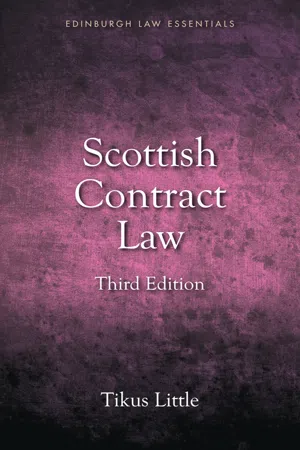Law
Actual Breach
Actual breach refers to a situation where a party fails to fulfill its obligations as specified in a contract or legal agreement. It occurs when one party does not perform as promised, leading to a violation of the terms of the contract. This breach can result in legal consequences, such as the non-breaching party seeking damages or specific performance.
Written by Perlego with AI-assistance
Related key terms
1 of 5
3 Key excerpts on "Actual Breach"
- B.S. Patil, S.P. Woolhouse(Authors)
- 2019(Publication Date)
- CRC Press(Publisher)
10Breach of Contract
10.0 IntroductionA breach of a contract is failure to perform an obligation arising out of the contract. Where there is failure to perform an obligation, in whole, it is a total breach. When an agreement is broken only in part it is a partial breach. If a party announces, before his performance is due, his definite unwillingness or inability to fulfil the contract, he thereby admits he is guilty of a breach. The breach in such a case is called an anticipatory breach. Occasionally a party may deliberately incapacitate himself or render impossible the performance of his contract duties; or may so interfere to render performance by the other party impossible. Such tactics also constitute a breach of contract.Every breach of a contractual obligation confers upon an injured party a right of action. However, there are a number of valid excuses for non-performance of contractual obligations. An actionable breach of contract, therefore, occurs when a promisor, without sufficient excuse or justification, fails to perform in accordance with the dictates of his agreement.Further, there is a distinction between breach of a contract and termination of a contract. When a contract comes to an end it is said to be terminated. Breach of contract may constitute a means of contract termination. However, there are a number of ways other than a breach by which a contract can be terminated. Full and satisfactory performance by both sides is the usual mode. The other modes include:- Release under seal
- Rescission by consent of parties
- Accord and satisfaction
- Exercise of option given to a party in a contract to terminate under certain circumstances or events
- Rescission by a party on account of repudiation or non-performance by the other party
- Frustration or impossibility of performance
It may be noted that many common forms of breach of important contract conditions are dealt with in their appropriate places in different chapters in this book. The law applicable to some forms of breach of contracts not dealt with elsewhere in the book is considered in this chapter.- eBook - PDF
- Tikus Little(Author)
- 2016(Publication Date)
- EUP(Publisher)
6 BREACH OF CONTRACT Many students of Scots law find breach of contract difficult: it is not helped by the fact that the key words used in breach of contract are sometimes used in different ways by different judges and academic writers. However, a question on breach of contract can usually be broken down into two key questions: • What type of breach is it? • What is the remedy for that breach? This chapter will focus on answering those two key questions but first it is necessary to consider the role of breach of contract.What is it for? The first point to note about breach of contract is that it is about performance of the contract rather than a problem with the contract itself. Previous chapters have discussed how contracts are formed and the problems which may occur if certain key elements are lacking or the terms of the contract are difficult to interpret or the contract contains clauses which are frowned upon in law. However, breach of contract is something else altogether: breach of contract is concerned with a failure to perform one’s obligations under the contract or to do so properly or on time. Each of the parties will have certain obligations under the contract and they will usually have agreed when those obligations are to be performed (due date for performance). Examples of behaviour which can amount to breach of contract include the following: • Failing to pay the contract price on time. The contract price will be the amount of money due to be paid by one party to the other for the goods, services, rent, etc. when it falls due. The contract will usually specify a time for payment and that is the due date for performance of that obligation. • Failure to deliver goods ordered under the contract. • Failure to deliver the correct goods (for example, a garden centre business which orders 3,000 lavender bushes from its supplier will not be pleased if 3,000 rose bushes are delivered instead) • Failure to deliver the goods at the right time. - No longer available |Learn more
Carter's Breach of Contract
(2nd Hart Edition)
- JW Carter(Author)
- 2018(Publication Date)
- Hart Publishing(Publisher)
P ART I Proof of Breach and Bases for a Right to Terminate 3 C HAPTER 1 Introduction Issues of the Law of Breach of Contract . . . . . . . . . . . . . . . . . . . . . . . . . . . . . . . . [1-01] (a) Existence of Breach . . . . . . . . . . . . . . . . . . . . . . . . . . . . . . . . . . . . . . . . . . . . . . [1-02] (b) Consequences of Breach . . . . . . . . . . . . . . . . . . . . . . . . . . . . . . . . . . . . . . . . [1-04] A Unitary Theory of Breach . . . . . . . . . . . . . . . . . . . . . . . . . . . . . . . . . . . . . . . . . . . . . [1-06] Dependent and Independent Obligations . . . . . . . . . . . . . . . . . . . . . . . . . . . . . . [1-08] (a) Definition and Explanation . . . . . . . . . . . . . . . . . . . . . . . . . . . . . . . . . . . . . [1-08] (b) Uses of the Distinction . . . . . . . . . . . . . . . . . . . . . . . . . . . . . . . . . . . . . . . . . . [1-13] (c) The Condition Precedent . . . . . . . . . . . . . . . . . . . . . . . . . . . . . . . . . . . . . . . [1-17] (d) The Presumption of Dependency . . . . . . . . . . . . . . . . . . . . . . . . . . . . . [1-21] Issues of the Law of Breach of Contract [1-01] Possible issues. Where one party to a contract (the promisee) alleges a breach of contract by the other party (the promisor), two issues may arise: 1 (1) whether a breach of contract has occurred; and (2) the consequences of any breach established. The emphasis of this work is on the second issue. (a) Existence of Breach [1-02] Establishing a breach of contract. Article 1.1 — ‘Breach of contract’ defined. A breach of contract occurs if a promisor: (a) fails to perform a contractual obligation within the time stipulated for its performance; or (b) commits an anticipatory breach of contract. A breach of contract can be established by proof that the promisor failed to perform a contractual obligation within the time stipulated for performance of the obligation.
Index pages curate the most relevant extracts from our library of academic textbooks. They’ve been created using an in-house natural language model (NLM), each adding context and meaning to key research topics.


